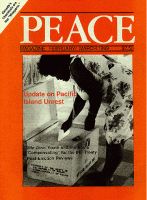
Peace Magazine Feb-Mar 1989, page 31. Some rights reserved.
Search for other articles by Disarmament Campaigns here
THE INTERNATIONAL PEACE Communication and Coordination Center, an independent group of European peace movements, met in the Hague, Netherlands, 26-29 October. The IPCC meeting coincided with the meeting of NATO's Nuclear Planning Group (NPG), and an IPCC press conference was held to respond to the NATO gathering. A torchlight march with some 200 participants also protested NPG modernization plans. "What is actually going on [inside the NPG]," said Wim Bartels, "is the undermining of the INF Treaty." Bartels is the IPCC coordinator and international secretary for the Dutch Interchurch Peace Council (IKV).
His statement was echoed by others at the press conference. A German Green Party member said that the U.S. wants to regain the option of targeting facilities in the USSR and Eastern Europe by developing new weapons systems. Such systems could be a stumbling block at the Geneva START negotiations, opening up a new grey area, he said.
The NATO desire to transfer more nuclear-capable bombers, specifically F-111s and the new F-15s from the U.S. to Europe, was also revealed. An Italian peace activist said that the Italian Peace Association will concentrate on preventing the transfer of nuclear-capable F-16 bombers from Spain to Italy. The Italian peace movement sees this move as a further step in the Mediterranean's nuclearization, a dangerous move for East/West and for North/South relations. Deployment of the planes in Southern Italy is incompatible with the INF Treaty and related to the NPG's new strategies; the NPG pressured the Italian government into accepting the transfer months ago. The peace movement wants a regional referendum on accepting the planes, she said. Over 50,000 people took part in a march from Perugia to Assisi on 2 October to urge the Italian parliament to reopen discussion on this issue.
Luc Deliens of the Flemish peace group VAKA, noting the Belgian government's refusal to sign a statement favoring modernization, said: "This is the first time there is a real non-nuclear component in a European government"; the Belgian peace movement will increase its campaigns, he added.
News was also released that the U.S. Congress cut the budget for the successor to NATO's Lance missile, until Europe pays some of the cost. The successor is called Atacms (Army Tactical Missile System). Congress had approved a budget of $15 million for it, but then decided to cut that in half "until a burden-sharing solution is found." The range of the Atacms would fall just within the limits set by the INF Treaty.
Polls in Britain, West Germany, and the Netherlands, conducted earlier in October, showed a majority of people opposed to NATO plans for modernizing short-range nuclear weapons; 71 percent of the Britons polled wanted negotiations instead of new nuclear weapons; 52 percent believed U.S. nuclear weapons were no longer necessary in Europe, while 45 percent felt U.S. troops in Britain should leave.
In the FRG, one-third of the people polled wanted a unilateral withdrawal of U.S. troops from the country, and 70 percent favored current Soviet politics. In the Netherlands, another poll found 63 percent opposed to modernization because they felt too many nuclear weapons were already in Europe and that glasnost would bring disarmament closer.
Bruce Kent of Britain's Campaign for Nuclear Disarmament said of the polls: "Plans for new nuclear weapons, which have split even the conservative West German government, have no mandate from the British public. Mrs. Thatcher's leading role in pushing for them is counter to the spirit of the INF Treaty and undermines the prospects for further disarmament moves in Europe. The proposed new short-range nuclear weapons are the ones most likely to be used in a time of crisis and almost certainly would trigger widespread nuclear escalation. Europe needs more treaties, not more nuclear weapons, a dismantling of the bloc system, not another 40 years of NATO and the Warsaw Pact."
NATO proposals to deploy a new short-range nuclear missile in FRG to replace Lance have created an outcry in that country. Opposition to the proposal comes from both progressive and conservative parties. Chancellor Kohl stated that all decisions about modernization should be postponed until 1992 - after West Germany's general election in 1991.
To make modernization more palatable, NATO is considering scrapping 1,000 obsolete nuclear weapons. NATO Supreme Commander in Europe, U.S. General John Galvin, announced in August that a "unilateral initiative" to reduce the number of U.S. nuclear weapons would be "popular in Europe, especially in the Federal Republic." Scrapping the obsolete weapons would also, Galvin said, have a "spinoff effect" of dealing with the political opposition Chancellor Kohl faces. The removal would only happen if "further modernization of nuclear short-range weapons" continues.
Disarmament Campaigns is published at Anna Paulownaplein 3, Post Box 18747, 2502 ES, The Hague, Netherlands. Tel 070 45 35 66. Editor: Shelley Anderson. Staff: Renate Durnbaugh, Jeremias Tucker, Koos Krijnders.

Peace Magazine Feb-Mar 1989, page 31. Some rights reserved.
Search for other articles by Disarmament Campaigns here